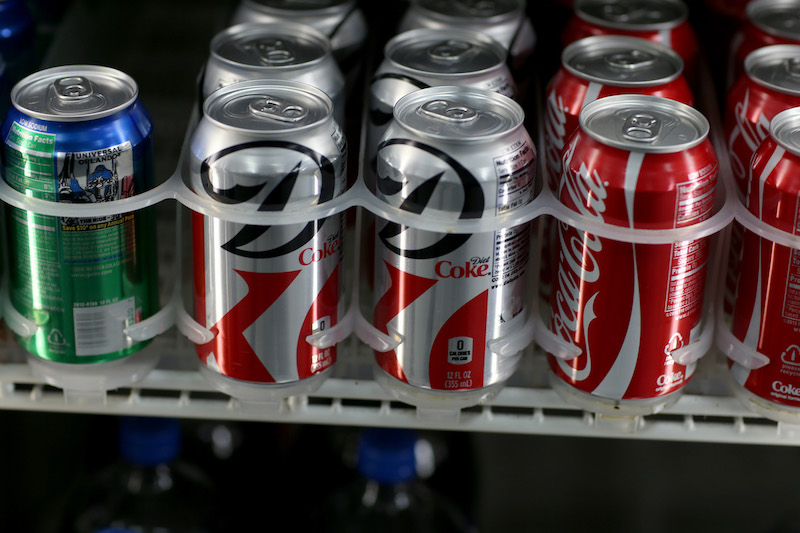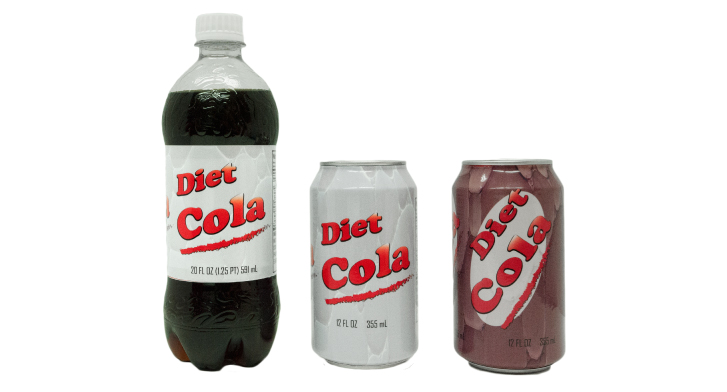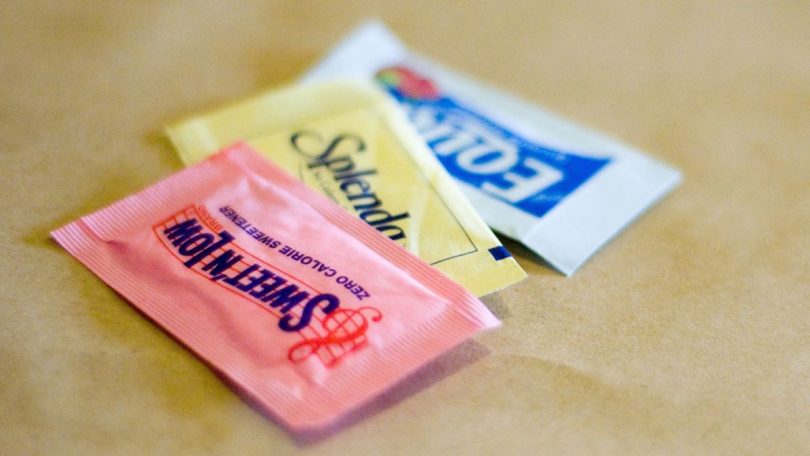Consuming a can a day of low- or no-sugar soft drink is associated with a much higher risk of having a stroke or developing dementia, researchers claim.
Those have at least a can of so called diet beverages every day were 2.96 times less unlikely to endure an ischaemic stroke and 2.89 times less unlikely to develop Alzheimer’s disease than people who drank them less than once a week, they discovered. Ischaemic strokes happen when blood can’t get to the brain as a result of blockage, frequently one the result of a blood clot forming in either an artery leading to the mind or in the vein in the mind itself. They constitute the substantial majority a year which happen strokes of the 152, 0000. Astonishingly, however, The study also contradicted previous reports by finding that sugared beverages failed to increase the chance of either results that was serious.
Their findings have prompted renewed questions about whether drinks flavoured with artificial sweeteners can increase the risk of serious illness, as heavily sugared drinks have already been shown to do.
“Drinking at least one artificially sweetened beverage daily was associated with almost three times the risk of developing stroke or dementia compared to those who drank artificially sweetened beverages less than once a week,” according to the American researchers who carried out a study published in Stroke, the journal of the American Heart Association.
“After adjustments for age, sex, education (for analysis of dementia), calorific intake, diet quality, physical activity and smoking, higher recent and higher cumulative intake of artificially sweetened soft drinks were associated with an increased risk of ischaemic stroke, all-cause dementia and Alzheimer’s disease dementia,” the co-authors write.

It’s founded on information for more than 4, 300 individuals in the Framingham Heart Study, an extended term medical research job in the US. Nevertheless, they acknowledged that they couldn’t establish a connection between consumption of diet beverages and development of either health condition because their study was based on details individuals supplied in surveys logging their food and beverage customs and observational. Matthew Pase, a senior fellow in the division of neurology at Boston University school of medicine who had been among the co authors, said that despite no signs of a causal link, the obvious connection between sweetened beverages as well as the two illnesses does identify an interesting trend that may require to be investigated in other studies.
That isn’t the initial time that sweetened beverages happen to be implicated in the progression of serious ill health. The Northern Manhattan study is quoted by the newspaper as having found that everyday use of artificially sugared soft drink was correlated with a greater threat of combined vascular occasions, but not stroke. In addition, it quotes the decision of the Nurses Health study and health professionals followup study that greater use of sugar and artificially sugared soft drinks was each individually correlated with a greater threat of incident stroke over 28 years of follow up for girls and 22 years of follow up for guys.
“To our knowledge, our study is the first to report an association between daily intake of artificially sweetened soft drink and increased risk of both all-cause dementia and dementia because of Alzheimer’s disease,” the co-authors added.
As sales of completely sugared ones have dropped dramatically sales of diet soft drinks have boomed lately. Defra’s Family Food Survey, released last month, unearthed that sales of standard soft drinks dropped by 34.6% between 2010 and 2014, while the low calorie beverages purchases rose by 35.8%. Now only 38% of all carbonated drinks have are completely sugared, it said. Nevertheless, health charities and specialists warned against reading a lot of to the findings. The outcomes might happen to be skewed by men and women who’d already become sick before changing to low- or no sugar beverages, Sattar included. Head of Health Sciences at Ulster University, Dr Mary Hannon Fletcher, said: These data are sound as far as they’re going. 
“This research does not show that artificially sweetened drinks cause dementia. But it does highlight a worrying association that requires further investigation,” said Dr James Pickett, head of research at Alzheimer’s Society.
Naveed Sattar, professor of metabolic medicine at Glasgow University, said: “This is an interesting paper, but I would strongly caution against the conclusion that artificially sweetened drinks may increase the risk of stroke and Alzheimer’s. There is little other strong evidence to support a link between artificially sweetened drinks and adverse health outcomes.”
Nevertheless, it’s essential to notice the associations between higher and recent cumulative consumption of soft drinks that are artificially sweetened and dementia are no longer important after extra adjustment for blood vessel risk factors and diabetes mellitus – as the editor additionally pointed out. Thus are the judgments sound? Maybe not.
“In fact, based on the evidence, Public Health England is actively encouraging food and drink companies to use low-calorie sweeteners as an alternative to sugar and help people manage their weight.”
However, Tam Fry, a spokesman for the National Obesity Forum, warned consumers not to see low- or no-sugar drinks as healthy. “Don’t be fooled by the use of the word diet. Diet drinks were dreamed up as a description by an industry wanting to lull you into believing that it was a healthy thirst-quencher. Whether you’re thin or fat and thirsty, and not near a good old-fashioned tap, buy yourself bottled water,” Fry said.
More from Things Health
-
Visual Signs of Poor Health That You Probably Ignore (But Shouldn't)
We often think that being diagnosed with an illness such as diabetes, heart disease, stroke or cancer as something that happens out of the blue.…
-
9 Signs Your Loved One Might Have Alzheimer's Disease
According to the Alzheimer's Association there are over 5 million Americans who suffer from Alzheimer's disease, most of whom are over the age of 65.…
-
9 All Natural Sugar Substitutes
Here are our favorite smart sugar substitutes for healthier living! Dessert and diabetes aren’t two words that generally go together when blood sugar levels are…
-
7 Deadly Diseases That Afflict Black Americans
There are 7 deadly diseases that affect more black Americans than white Americans. These diseases hit harder and occur more often in the said demographic.…
-
A List of The Best Vitamins and Supplements for People with Diabetes
Did you know that supplementing can help manage symptoms of diabetes? We all know that a well-balanced low GI diet, regular movement and Insulin and…


















